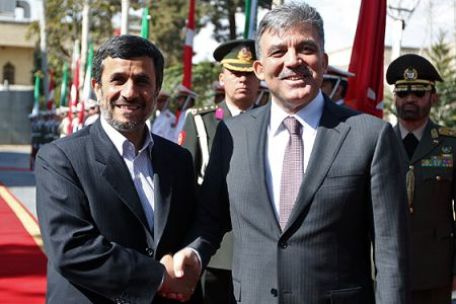Confrontation between Iran and Turkey Is Unlikely

Traditionally, Middle East has been a hotbed for unexpected political turns. Today, the mutual relations between Iran, Iraq, Syria, Turkey and Israel are not what they used to be six months ago. Four days ago, a former Mossad official advised Tel Aviv to start negotiations with Turkey in order to restrain Tehran. This is despite the fact that tensions between Ankara and Tel Aviv are still running high following the killing of Turkish peace activists by Israeli commandos in the Mavi Marmara incident. Western media are speculating a gap between Iran and Turkey, following Ankara’s contradictory stance towards Syria and Iraq compared to Iran’s. Iranian Diplomacy discusses diplomatic affairs between Turkey and Iran with Makan Eidipour in relation to Tel Aviv’s activities:
IRD: A former Mossad official has recommended Israel to mend fences with Turkey to curb Iran and Syria. How do you evaluate this?
ME: Turkey-Israel military relations are not based on trust, as the Israelis are concerned that a technological aid to Turkey may end up in Iranian hands. But the reality is that in their security doctrines, Israelis had never considered thoughtfully cooperation with Islamic countries and that has brought up the current crisis. Some may compare this to the collaboration between Israel and Egypt. Those cooperation however were limited to security and information exchanges and they never involved technology and hardware exchanges. Recent Turkish policies as well as the country’s approach to Palestinian issues, particularly after the incident regarding the humanitarian aid convoy to Gaza have positioned them against Israel.
IRD: Acknowledging the lack of constructive partnership between the two sides, how would you describe the existing affairs between Turkey and Israel?
ME: Turkey has managed to maintain diplomatic relations with Israel despite all the tension and that is a diplomatic achievement by itself. Yet, Ankara has not concealed its position towards the Palestinian problem and Israel is aware that it is dealing with a country whose religious fervor and Islamic values are in direct conflict with its interests. Perhaps there cannot be a strategic partnership between the two countries and any further collaboration would be in the same vein as previous relationships, as Israel has no influence on the Turkish governmental structure. Nevertheless, the Zionist regime will not spare efforts on striking Turkey’s current government.
IRD: The unrest in Syria has affected Tehran-Ankara relations. How do you see the prospect of the once warm ties between Iran and Turkey?
ME: The relations between Iran and Turkey won’t be afflicted by serious damage. As a powerful neighbor and one that has become increasingly close to Iran in recent years, Turkey holds a special value for Tehran. It is very unlikely for Tehran to make a choice between Turkey and Syria. Ultimately, Iran should not place itself in a position to have to be forced to choose between its allies. Iran’s relations with Turkey are completely separate from its ties with Syria. While keeping up its support for Syria, Iran can send a message to its neighbors that it is determined to retain good relationships. In fact, the last thing Iran wants to see is tension with regional tension.
IRD: Could the recent scuffle between the Iraqi PM Nuri Maliki and Vice President Tariq el-Hashemi have an adverse effect on relations between Iran and Turkey?

